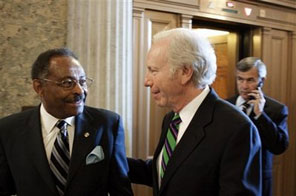Report: Key senators would nix 'cap and trade'
WASHINGTON: Three key senators are writing a new climate bill without a broad "cap-and-trade" approach to reducing carbon pollution, leaving behind what has been the central feature in the debate over climate legislation for years, The Washington Post reported Friday night.
Cap and trade, in which overall pollution reduction targets are met by allowing facilities to buy and sell pollution credits, has become so politically unpopular that its Senate passage is viewed as unlikely.
So Sens. John Kerry, D-Mass., Lindsey Graham, R-S.C., and Joe Lieberman, I-Conn., are planning an alternative to be introduced next month, the Post reported on its Web site. The bill would apply different carbon controls to different sectors of the economy instead of taking a national approach.
"This is a different bill," Lieberman told the Post. "We haven't abandoned the market-based idea, but we're willing to negotiate with colleagues who have different ideas."
A cap-and-trade bill passed the House last year in a close vote that some Democrats came to regret casting. It remains President Barack Obama's preferred approach as he pushes to cut the country's emissions by 17 percent by 2020 to meet internationally agreed upon goals.
Opponents portray cap-and-trade as an energy tax in disguise and energy companies have been lobbying and advertising heavily against it.
According to participants, Graham told environmental leaders in a meeting Wednesday that "cap-and-trade is dead," the Post said.
The new bill by Kerry, Graham and Lieberman, who have taken lead roles in the climate debate, would apply different approaches to three major emission sources: electric utilities, transportation and industry, the Post said, attributing the details to unidentified people familiar with the process.
Utilities would have to meet an overall emissions cap that would grow stricter over time. A carbon tax could be levied on motor fuel. And industrial facilities would be exempted from an emissions cap for several years, before it would be phased in.
This more limited approach could pick up more votes in the Senate but even so would face a tough road with the Senate calendar crowded with health care legislation and other matters.






